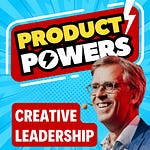Today’s guest tells me she steals ideas from the most unexpected places. Instagram Reels, stand-up comedy, psychology research, TV shows, and even conversations with Uber drivers. Nothing is safe from my habit of creative cross-pollination says Rach Davis.
Rach is a facilitator, a Miro hero, and a self-proclaimed ‘butter brainiac’ (yes, that’s a thing). She thrives on unconventional thinking and loves taking ideas from one world and transplanting them into another.
Her superpower? Cross-pollination.
This post is a summary of our conversation in which we cover:
How cross-pollination can make you a more creative facilitator
Why looking outside your industry is the key to innovation
A real-life example of turning a random joke into a powerful workshop exercise
Practical techniques to engage every personality type in a session
The one mindset shift that can revolutionize your facilitation approach
You will find this episode useful if you are:
A Product Manager looking for fresh ways to engage teams
A facilitator who wants to bring more creativity to workshops
A UX designer seeking new brainstorming techniques
A Business Analyst who needs to foster collaboration across departments
A startup founder who wants to encourage innovation in their team
The Secret Sauce of Creative Facilitation
We are all creatures of habit. If you’re a facilitator, you probably have your go-to techniques, your favourite frameworks, and that one icebreaker you swear by. But if you only ever look inside your own field for inspiration, you’re limiting yourself.
Rach believes that the best facilitators are curious explorers. They take ideas from psychology, architecture, cooking, improv comedy—basically anywhere—and remix them into something new.
I love the Design Thinking example shared where she poses the question
“if you were designing a hospital waiting room, would you only study other hospitals? Or would you look at the customer experience in other places?”
That’s where the magic happens—combining ideas from different worlds.
The Unexpected Idea That Became a Workshop Activity
One day, Rach was scrolling through Instagram reels when she stumbled upon a stand-up comedian taking audience suggestions. Someone shouted, “What if you made a time machine out of a Subaru Outback instead of a DeLorean?”
That silly, off-the-cuff joke sparked an idea.
What if she turned that into an icebreaker exercise?
The result? The Flux Capacitor Activity. In this exercise, participants imagine building a time machine out of something random—like their company culture. The fuel that powers the time machine represents their team’s key motivators. Coffee? Collaboration? Sheer chaos?
It’s a fun and unexpected way to get teams thinking about what truly drives them.
Facilitating for Every Personality Type
Not everyone loves talking in workshops. Some people freeze. Others need time to process before they contribute. And if you ignore those differences, you risk losing half the room.
That’s why Rach is a huge advocate of multi-modal facilitation—giving people different ways to engage beyond just talking.
A few techniques she shared in our conversation:
✅ The 60-Second Think Break – Before throwing people into a discussion, give them a full minute to jot down their thoughts. It reduces panic and makes participation more inclusive.
✅ The Lego Duck Activity – This classic Lego Serious Play exercise reveals how people interpret the same instructions differently, highlighting gaps in communication.
✅ The One-Legged Explanation – Want someone to get to the point? Ask them to explain their idea while standing on one foot. When they lose balance, they stop talking. It forces concise, clear thinking.
The Power of a Smile in Workshops
One of Rach’s favourite facilitation moments? When someone smiles.
Why? Because a smile is a tiny signal that something has shifted. It means someone feels comfortable enough to engage. And when people are engaged, they’re open to new ideas, better collaboration, and (surprisingly) more creative problem-solving.
The real goal of facilitation isn’t just to run a smooth session—it’s to help people change their minds.
The One Work Habit Rach Would Abolish
If she could wave a magic wand and remove one thing from the workplace, it would be this:
The “That’s how we’ve always done it” mindset.
Sacred cows. Corporate traditions. Outdated processes that no one questions. Rach would wipe them all out and replace them with curiosity.
Because the best ideas don’t come from playing it safe. They come from looking beyond your own industry, borrowing ideas from unexpected places, and making connections no one else has thought of.
Final Thought: Give Yourself Permission to Steal
The next time you’re watching Netflix, scrolling social media, or even standing in a long queue at the supermarket—pay attention.
A quirky joke, a weird customer interaction, or a random product feature might just be the next great workshop activity.
So look around you. Steal inspiration. Cross-pollinate ideas. Be the creative weirdo in the room (or just the creative one).
And if anyone asks where you got your brilliant idea?
Just smile and say, “I cross-pollinated it.”
A huge thank you to Rach Davis for the inspiration behind this article. Want more unconventional facilitation ideas? Check out her work at rachedavis.com.
Got your own stories of creative facilitation? Drop me a message on LinkedIn—I’d love to hear them.
Until next time, keep stealing (ethically, of course).
Resources Mentioned in This Episode
If you want to dive deeper into the topics Rach discussed, check out these books and resources:
📖 Creative Confidence – by Tom Kelley & David Kelley (IDEO)
📖 Facilitating Breakthrough – by Adam Kahane (A guide to unlocking breakthrough ideas in group settings)
Guest: Rach Davis
Meet Rachel, a Workshop Experience Designer and Facilitator who runs her own business as an independent consultant. With almost 20 years of strategy and workshopping experience, she's a firm believer that play is the doorway to our wildest ideas. Coming from an environment where being creative was like pulling teeth, she now helps others move past blockers to creative problem solving by crafting workshop experiences infused with joy and energy.










